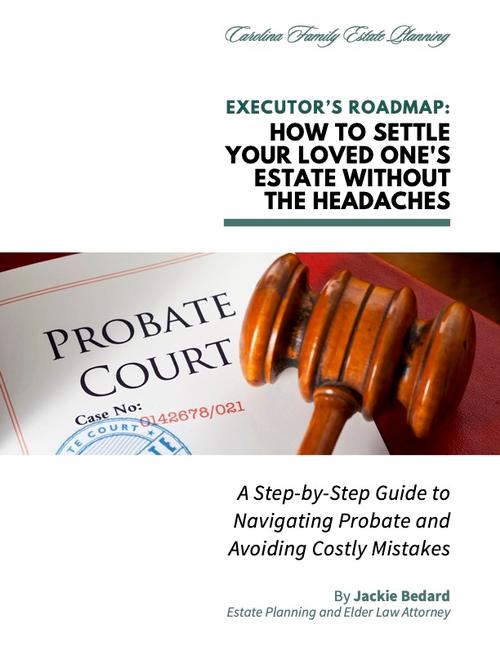 If you have found yourself in charge of administering a loved one's estate, you might be wondering about the differences between an administrator, a personal representative, and an executor and what responsibilities you have. All of these titles essentially refer to a person appointed by the court to administer the deceased’s estate. Let's take a look at each one and discuss.
If you have found yourself in charge of administering a loved one's estate, you might be wondering about the differences between an administrator, a personal representative, and an executor and what responsibilities you have. All of these titles essentially refer to a person appointed by the court to administer the deceased’s estate. Let's take a look at each one and discuss.
What is an Executor of an Estate?
Executor (or executrix if female) is the traditional term for the person named in a will (and subsequently appointed by the probate court) to oversee the estate of a person who has died with a will. Some states have now adopted statutes that replace the term “executor” with “personal representative,” so the terms are often used interchangeably.
What is the Administrator of an Estate?
An administrator or administratrix is the person appointed by the probate court to administer the estate of a person who has died without a will (intestate).
If I’m Named An Executor Or Personal Representative In The Will, Can I Start Administering The Estate?
No. You must first file the will with the probate court, establish the will’s validity, and be formally appointed as executor or personal representative. Before rushing off to the courthouse, you should be sure that you have the correct will. Sometimes a family member will find a will, assume it’s the right one, and head on down to the courthouse only to later discover that there is a more recent will or trust that replaced the revoked prior will.
Important Tips For Being An Executor or Administrator
Serving as Executor or Trustee can be a difficult and sometimes thankless role if the Beneficiaries do not understand the significant responsibility that you have bestowed upon them.
Communicate with Beneficiaries
One of the biggest complaints that Beneficiaries raise is lack of communication. Insufficient communication often leads to inappropriate expectations or assumptions on the part of the Beneficiaries which can quickly escalate into a full-blown dispute.
The best course of action is to communicate with the Beneficiaries early and often. Don’t be afraid to repeat yourself, and don’t hide information because you are concerned that it might hurt someone’s feelings. However, do seek to convey information in a thoughtful and empathetic manner. If a Beneficiary has been disinherited or is inheriting less than they may have anticipated, it’s okay to acknowledge that you understand their disappointment. Many beneficiaries may have formed some sort of assumption about the size and nature of their loved one’s estate, which may be inaccurate. For example, there may be significantly fewer assets than anticipated or significantly more debts than anticipated.
We’ve seen estates where the Decedent had previously received a rather large inheritance or windfall, leading the Decedent’s Beneficiaries to assume there would be a large inheritance, only to discover that the Decedent had squandered most of the windfall or inheritance. In other estates, we’ve seen a Decedent who had the outward appearance of wealth, only for the family to discover that they were significantly in debt and had very little if any, positive net financial worth.
Organization is Key to Administering an Estate
Estate Administration involves a significant amount of paperwork. It is critical that you stay organized. Maintain a calendar with all appointments and deadlines. Clear and organized record-keeping will also reduce the likelihood of estate disputes. From time to time during the Estate Administration process, you may be required to produce certain documents or receipts. Being able to produce them in a timely and organized manner will keep the Estate Administration advancing in an organized and efficient manner.
Follow the Law
This might sound obvious, but you’d be surprised how many Executors and Administrators don’t understand or follow their legal duties. The North Carolina General Statutes set forth specific rules regarding the Estate Administration process that govern:
- Properly determining the validity of the Decedent’s Will and/or Trust;
- Properly interpreting the terms of the Decedent’s Will and/or Trust;
- Various required Court filings and accountings;
- Properly notifying known and unknown creditors of the Estate;
- Properly settling claims of the Estate;
- Proper filing of applicable tax returns and payment of taxes owed;
- Proper notification to Beneficiaries or potential Beneficiaries of the Estate and
- Priority of distributions of the Estate if there are not enough assets in the Estate to meet all distributions specified in the Will or Trust.
Remember, as executor or trustee, you are personally liable for complying with the law, meaning that if you make a mistake, you could be held responsible by a court for correcting the error. If such an error caused financial harm to the Estate, then you would need to reimburse the Estate from your personal savings to correct the error. Therefore, many Executors and Trustees hire a law firm to assist them with the Estate Administration process. By hiring a reputable law firm to assist you, you limit your liability exposure by shifting your liability to the law firm’s professional malpractice liability.
Take Care of Yourself as the Executor
Remember, this is a marathon, not a sprint. Don’t expect to complete the Estate Administration process overnight. In addition to grieving the loss of a loved one, chances are that you have other responsibilities such as family obligations, a job, etc. Again, hiring a law firm to assist you can help ease some of the administrative burden so you can get back to your day-to-day responsibilities.


